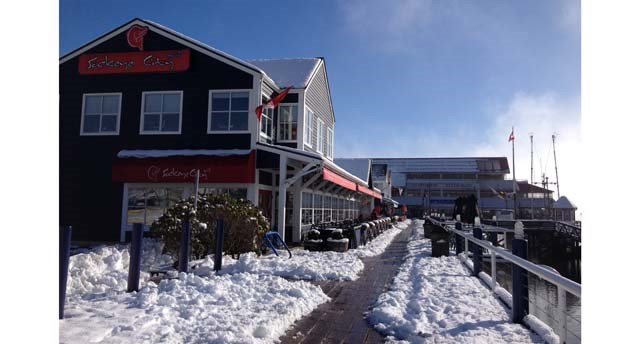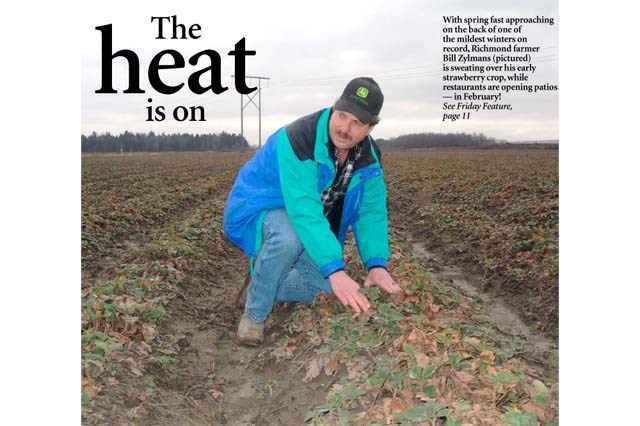Bill Zylmans doesn’t know whether to laugh or cry.
In more than 40 years of farming in Richmond, Zylmans – whose strawberries are renowned for being among the best in the Lower Mainland – has never known his crop to be this far forward.
After the mildest winter he can recall, his 18 acres of strawberries at W&A Farms, off Westminster Highway and No. 7 Road, are, he said, at least three weeks ahead of schedule.
Zylmans has delved deep into his farmer’s “log” and he can’t find any reference in his personal history book to the crop flourishing this early.
One might be forgiven for thinking this would be good news for the likes of Zylmans and other berry farmers across Richmond. But the unseasonably warm winter is producing a bead or two of sweat on Zylmans’ brow.
“Everything is way ahead of where it should be,” said Zylmans, while inspecting his strawberry crop earlier this week.
“The strawberries, raspberries, blueberries, everything is coming along earlier than I’ve ever known. I keep notes in a kind of log from all my years in the business and I’ve never seen this before; I’ve never known the plants to be this far forward at this time of the year.
“However, the next two weeks are crunch time. If we get a real cold snap, which can happen at this time of the year, it could do some serious damage to the plants.”
Zylmans has been monitoring the weather forecast closely this week.
And, with Environment Canada predicting the mercury to dip below freezing on Saturday night, the Richmond farming veteran is crossing his fingers and toes the berry plants will survive into next week.
“(This weekend) I think, that’s going to be the crucial point,” he told News, while surveying his acreage next to Lulu Island Winery.
“If any frost gets into the crown (of the strawberry plant), then it could be trouble, as the plant might not have enough time to recover for the spring.
“But, as I said, this is all new territory for me; I haven’t travelled down this path before.”
And even if his crop does make it through the weekend and dodges any other March temperature plunges, he’s not sure his customers are conditioned for a super early strawberry feast.
“May 20 is the earliest I’ve ever harvested,” said Zylmans about his 18 acres of u-pick and fresh-market strawberries.
“We could be well ahead of that this year, but it’s not necessarily a good thing; people are tuned in to doing certain things at certain times of the year. They might not be ready to pick strawberries at the beginning of May! June is strawberry season, right?”
PATIO SEASON IS ‘SNOW’ BOTHER
Almost a year ago to the day, James Vernon was sweeping several inches of snow off his restaurant’s patio in Steveston.
This February, the only thing Vernon, floor manager at Sockeye City Grill at Fishermen’s Wharf on the Steveston waterfront, has been sweeping off the patio is satisfied customers, who’ve been soaking up the inclement sunshine.
“We’ve had to open up the patio several times in the last two weeks,” said a delighted Vernon.

“This very day last year (Feb. 24) we were covered in snow. But the last time I can recall it being anything like this was in 2010, the Olympic year, when we had the Dutch staff from Heineken House down in Steveston with their big Dutch bikes on the patio.
“That winter was kind of comparable, but maybe not quite as mild as this.”
Vernon said his staff has been laying out blankets on the patio chairs for those who need them, but “not too many have been using them.”
“The patio has been very popular and as soon as that sun comes out and people start sitting here, it seems to attract even more people to the restaurant.”
And when they’re out basking in the sun, “they feel like they’re in California,” joked Vernon with a smile.

MILD WINTER NO RECORD BREAKER
This winter in Richmond may have been the mildest in living memory, according to farmer Bill Zylmans’ almanac.
But the temperature would have to explode off the weather charts in the last few days of February if it’s going to break any official records.
Matt MacDonald, a meteorologist with Environment Canada, said the seasonal average for Richmond so far – for December, January and February – is looking like it’ll be at least two degrees Celsius shy of the warmest on record.
“We are not quite done yet with compiling the official average temperature at YVR over the winter,” said MacDonald. “But it’s certainly not been record-breaking in terms of the temperature, by any means.
“February has been very mild (in Richmond) with an average temperature of eight degrees (Celsius); the normal is 4.9.”
January’s average, said MacDonald, was 5.6; the norm is 4.1 and December`s average was 4.9; the norm being 3.6.
“If we add them all up, the average so far for this winter has been 6.2. The norm being 4.2,” he added.
“A full two degrees above normal is quite significant, but it’s still well short of the record average of 8.5.”
MacDonald said he expects (the 6.2 average right now) to rise a little after Environment Canada has recorded the last week of February. However, as feared by the aforementioned Zylmans, Richmond is definitely in for some cooling temperatures this weekend.
“I expect it to drop below freezing, perhaps as low as minus three, maybe Saturday into Sunday or a little later,” said MacDonald. “It should gradually warm up again as next week moves on.”
The weather-maker that’s responsible for the distinct lack of cold and snow this winter being a “massive ridge of high pressure,” explained MacDonald, that’s dominated all the weather in the region and has pushed everything cold to the east.
“The precipitation is actually normal, but very little has fallen as snow,” he added.
“The snowpack is about 15 to 30 per cent of the normal and that will likely be an issue later on this year.
“This area relies heavily on the snow melt, so that is a concern for the seasons ahead.”
The small snow pack could lead to dangerously low water levels in rivers and streams etc, which, in turn, can mean higher water temperatures.
The higher temperatures can cause higher mortality among resident fish, or among young salmon rearing in creeks.
Plus, the province’s reservoirs rely partly on the snowpack, but Metro Vancouver said there is enough water supply at the moment and they don’t expect it to be a factor.



